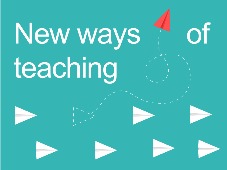Mastering the business world with skills tasting

In New Ways of Teaching, lecturers talk about their innovative, creative and effective teaching initiatives. From unusual teaching methods to new technologies—anything is possible. How do these ideas arise and what impact do they have on students? This month: prepared for working life with the help of skills workshops.

How can you narrow the gap between theory and practice? Dr Aline Seepma and Dr Luca Gelsomino, both assistant professors at the Faculty of Economics and Business, are making an effort by offering ‘skills tasting’ in their innovative Master’s course unit Purchasing.
To experience is to learn
Aline Seepma: 'Skills tasting comprises a series of workshops in which students practice and experience skills that are closely related to their field, in this case strategic procurement. This involves skills such as strategic negotiation, project management, strategic decision-making, and cross-functional alignment. Skills tasting aims to introduce students to relevant strategic skills and develop these through an experiential and hands-on approach. As a result, students become actively involved in various skills in a structured and goal-oriented manner, in an inspiring and safe environment.'

Preparation as the key to success
'I developed the skills workshops based on the growing need to prepare students for the labour market. The skills workshops help bridge the gap between theory and practice. It is a manageable and proven concept that is suitable for small-scale teaching but also for large-scale teaching such as in our course unit, which more than 150 students attend. Apart from the student’s need, my intrinsic motivation also played a major role in setting this up: the wish to see students grow and to provide them with the necessary tools to be successful in their future careers. It is a gratifying task to run the skills workshops together with my colleague Luca Gelsomino.'
Taking control
'The nice thing about the Purchasing course unit is that students take control and decide for themselves which skills pathway they would like to explore. At the beginning of the course, they draw up a plan and set out their intentions. In this process, they inventory which skills are important for the job they are pursuing and they would therefore like to learn. On the basis of this plan, students will follow the course unit and skills workshops.'
The road to competence
'The workshops are structured to follow a so-called skill-tasting loop, where students first observe the skill based on a demonstration and/or practical examples given by an expert. They then reflect on this, prepare for the actual application of the skill, get the chance to practice and, finally, there is individual and collective evaluation.
Although different in content, the workshops share a common goal: to prepare students for the challenges of strategic procurement. By learning from real-life case studies, students develop skills that can be applied both in the procurement practice and outside of it and contribute to success in today's business world.'
A closer look at the business world
'The workshops are developed and taught together with experts from the field. Experts include, for example, Chief Procurement Officers (CPOs), procurement directors, or procurement managers. They introduce real-life situations and share their personal experiences in relation to the theme of the respective skills workshop. Subsequently, students themselves get to work on a case study, after which they reflect on the skill and its development together with the expert and the lecturer. Many low-threshold interactions take place between the students and the procurement experts, which allows for students to get a closer look at their possible future role.'
A wealth of knowledge
'Having experts from the field actively participate in the Procurement course unit through the skills workshops is something students appreciate very much. The workshops provide an environment in which lecturers, professionals, and students make an impact together within and outside the field. Students also value the freedom they have to design their own skill-development pathway and that reflection, discussion, and experimenting are part of the process. The acquired skills can be applied in procurement and general business, as well as in their personal lives.'
A forward-thinking mindset
'For us lecturers, the skills workshops are a great way to work together with students. Because the skills workshops are not mandatory and students can compile their own pathway, it makes for interesting and interactive sessions. The workshops offer wonderful synergies between education and business practices and give students a chance to work on their employability. In addition, it sparks enthusiasm about the procurement profession and gives them a much better idea of potential positions and how they can achieve strategically better results from that position, together with the procurement department of the organization.'
More information
- Aline Seepma
- Luca Gelsomino
- Read other editions of New Ways of Teaching
| Last modified: | 14 January 2025 10.01 a.m. |
More news
-
24 March 2025
UG 28th in World's Most International Universities 2025 rankings
The University of Groningen has been ranked 28th in the World's Most International Universities 2025 by Times Higher Education. With this, the UG leaves behind institutions such as MIT and Harvard. The 28th place marks an increase of five places: in...
-
05 March 2025
Women in Science
The UG celebrates International Women’s Day with a special photo series: Women in Science.
-
16 December 2024
Jouke de Vries: ‘The University will have to be flexible’
2024 was a festive year for the University of Groningen. In this podcast, Jouke de Vries, the chair of the Executive Board, looks back.
